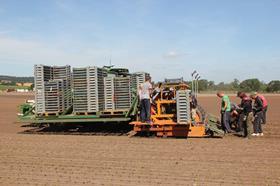
Freedom of movement for EU citizens will end even if there is no replacement system if the UK leaves the EU without a deal,according to reports.
Theresa May’s government had promised to gradually transition away from freedom of movement rather than suddenly stopping it, and this hardening of the immigration strategy has concerned the agricultural sector.
The NFU is urging the government to ensure farming businesses can still access migrant labour in the event of a no-deal.
The Home Office said arrangements for people coming to the UK for longer periods of time and for work and study “will change” and that details of “improvements” to the previous government’s plans for a new immigration system are “being developed”.
The NFU and its members have expressed dismay at this development. With just two months until Britain leaves the EU, there is now no policy in place that will enable farmers, growers and any other industry to recruit from outside the UK.
The NFU immediately sent a letter to the home secretary expressing the need for urgent clarity about how EU workers can come to the UK post-Brexit and to reiterate the absolutely crucial role they play delivering safe, traceable and affordable food to the British public.
The union has also raised it at a senior level within Defra, the Home Office, cabinet, and called for support from key industry stakeholders and trade associations.
Members are being encouraged to to ask their MPs to write to the home secretary, calling for a transition measure, such as the Leave to Remain process which now appears to have been scrapped, to be reinstated.
If no transition measure is forthcoming that provides the assurance the industry needs to continue to recruit EU workers post Brexit, then the NFU said it would call for the urgent introduction of a new immigration policy that allows farm businesses to recruit the workers they need for both temporary and permanent positions.
For horticulture, the NFU is also calling for the immediate expansion the Seasonal Workers Pilot scheme to enable recruitment for the autumn and Christmas period, and to reach a full scheme for 70,000 workers at the start of 2020.
Members may also be able to mitigate some of their shortages for next year by supporting their workers to apply for theEU settlement scheme.
While this scheme is designed to offer EU workers permanent residency in the UK, it can also be used to enable seasonal workers the right to come to the UK for up to five years.



